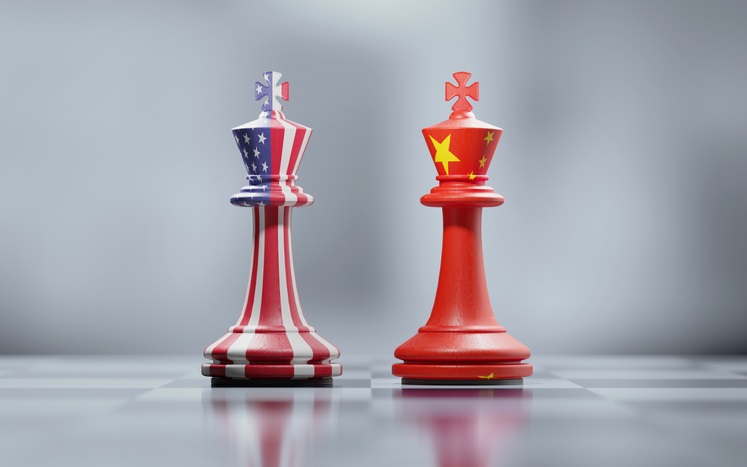Will global equities benefit from US/China trade talks?
Tensions show signs of easing, and stocks can only benefit – provided tariffs do not rise.
26th August 2020 14:08
by Graeme Evans from interactive investor
Tensions between the two countries show signs of easing, and stocks can only benefit – provided tariffs do not rise.

Signs that US-China trade tensions have become more bark than bite today encouraged a leading European bank to maintain a risk-on stance towards global equities.
Wealth managers at UBS think that the S&P 500 will trade at 3,500 by June, under a central scenario where there are no renewed nationwide lockdowns in major economies and a widespread vaccine is available by the second quarter of next year.
The S&P 500 has been setting new records in recent weeks, including on Tuesday after closing 0.4% higher at 3,443.
Frustratingly for UK investors the FTSE 100 index has lagged the tech-fuelled performance of Wall Street by staying close to the 6,000 threshold.
A thin day for corporate news meant there was little momentum in London's top flight, with popular stocks including Vodafone (LSE:VOD) and GlaxoSmithKline (LSE:GSK) among those on the back foot today.
UBS's hope that global equities will be able consolidate and build on recent gains comes amid signs that US and China are committed to the trade deal they signed in January.
- Can European stocks outperform both the US and China?
- Seven big risks keeping fund managers awake at night
The bank said:
“We think tensions between the two sides remain more bark than bite. As long as tariffs don't rise, we see little reason to expect a significantly negative economic impact in the near term.”
While some volatility may persist in the run-up to November's presidential election, the continued support of the US Federal Reserve should underpin markets.
Investors will get some more guidance tomorrow on how far the US central bank is prepared to go to safeguard the economic recovery when Federal Reserve chairman Jerome Powell speaks to the Jackson Hole Symposium. The annual event will this year be attended virtually by central bankers, economists and business leaders.
UBS thinks that as long as there is no break in the US-China phase one trade deal there is a good chance that global economic output can return to pre-pandemic levels by early 2022.
- Chart of the week: are US markets too big to fail?
- Take control of your retirement planning with our award-winning, low-cost Self-Invested Personal Pension (SIPP)
The simmering trade tensions may even benefit some sectors, particularly through the bipolarisation of the tech landscape as the US and China jockey for supremacy in areas such as 5G and semiconductor manufacturing.
UBS said:
“While a dual system is less efficient globally, it may benefit a number of 5G-linked companies, both among those enabling the technology and the platforms built upon it.”
It advises investors to consider diversifying exposure from the big tech stocks behind the recent Wall Street rally towards the 5G theme and others accelerated by the pandemic.
The bank also believes the trade tensions and Covid-19 will prompt governments and companies to look for ways to realign their supply chains: “We see automation and robotics, cybersecurity, and testing, inspection and certification as structural beneficiaries of this trend toward a more local world.”
Full performance can be found on the company or index summary page on the interactive investor website. Simply click on the company's or index name highlighted in the article.
These articles are provided for information purposes only. Occasionally, an opinion about whether to buy or sell a specific investment may be provided by third parties. The content is not intended to be a personal recommendation to buy or sell any financial instrument or product, or to adopt any investment strategy as it is not provided based on an assessment of your investing knowledge and experience, your financial situation or your investment objectives. The value of your investments, and the income derived from them, may go down as well as up. You may not get back all the money that you invest. The investments referred to in this article may not be suitable for all investors, and if in doubt, an investor should seek advice from a qualified investment adviser.
Full performance can be found on the company or index summary page on the interactive investor website. Simply click on the company's or index name highlighted in the article.